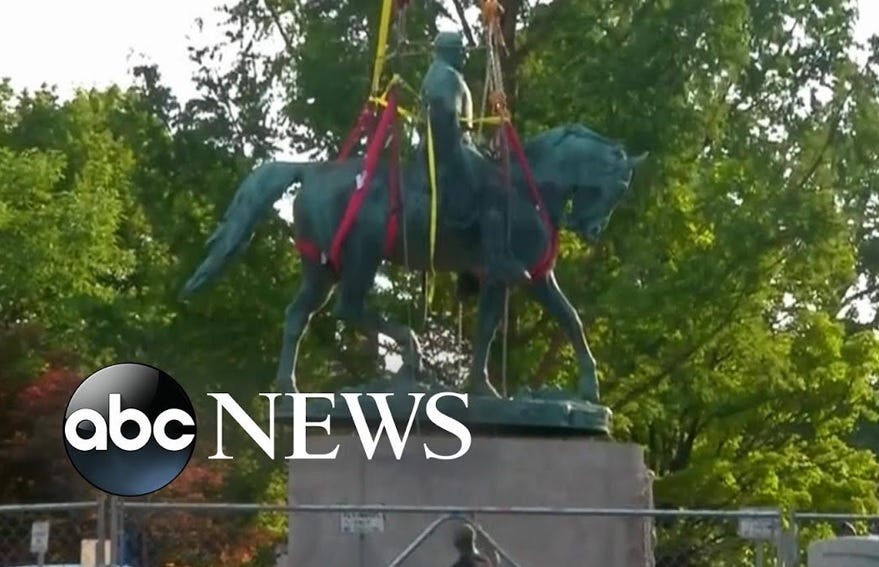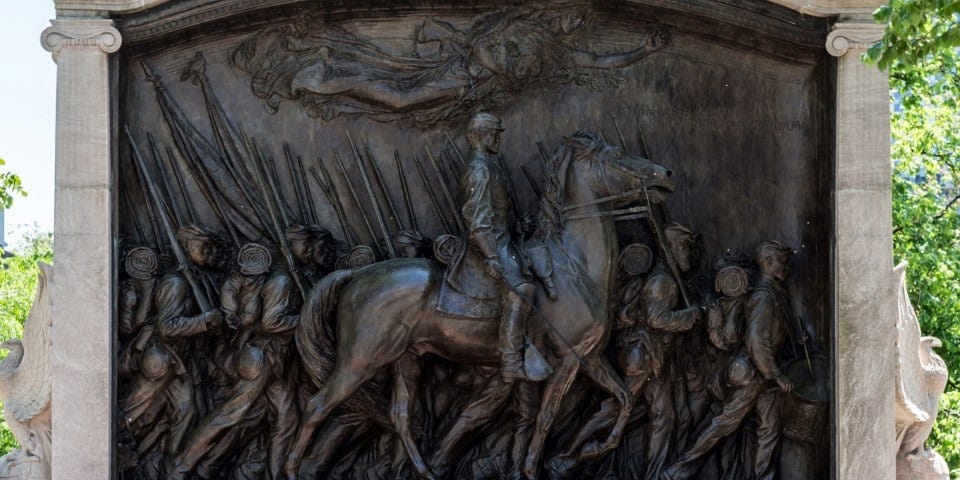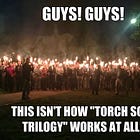RFK Jr.'s Brain Worm Now Has Boner For Confederate Monuments
Guess the Civil War had very fine people on both sides, too.

Family Embarrassment Party presidential candidate Robert F. Kennedy Jr. last week said on a far-right podcast that he has a “visceral reaction against” the removal of Confederate statues, because that might allegedly “erase history,” the Washington Post reports (gift link). In particular, Kennedy was commenting on the removal of the statue of Robert E. Lee in Charlottesville, Virginia, the excuse for the deadly 2017 Unite the Whites Right rally.
What a coincidence! When we read about Kennedy’s defense of the monuments that sprang up across the South during the Jim Crow era to reinforce white supremacy and “Lost Cause” ideology, our viscera reacted, too. Fortunately, a good rinse and some coffee soon got the taste out of our mouth.
Kennedy wished we could all still be back in the land of cotton Friday during a visit to the podcast hosted by rightwing sack of ignorance and beanies Tim Pool, because, he said, it’s not “a good, healthy thing for any culture to erase history.” That’s pretty funny, in a not-funny way, considering that the monuments themselves were part of a very deliberate effort to erase the actual history of the Confederacy and replace it with a fake version that portrayed the Confederate cause as noble.
In the false Lost Cause version of history, Confederate heroes fought not to preserve the institution of slavery, but to “defend their homes” from mean Yankee invaders who wanted to take away everything that mattered to them (slavery and white supremacy. Also magnolias).
You know, Yankee invaders like the 54th Massachusetts Volunteer Infantry Regiment from Kennedy’s home state, the Union’s first Black regiment, as dramatized in the movie Glory. You want a monument to inspire the study of history? Here’s Boston’s memorial to the 54th Massachusetts and its commander, Col. Matthew Broderick.
Kennedy’s comments made clear he’s swallowed the Lost Cause narrative hook, line, and cotton gin fan blade.
“I have a visceral reaction against, against the attacks on those statues,” he said. “There were heroes in the Confederacy who didn’t have slaves and, you know, I just, I just have a visceral reaction against destroying history. I don’t like it. I think we should celebrate who we are.”
He added: “We should celebrate the good qualities of everybody. … If we want to find people who were completely virtuous on every issue throughout history, we would erase all of history.”
Again, it’s the monuments themselves that created a revisionist history. That Kennedy seems unaware of that very reality indicates just how deeply the false narrative has penetrated Americans’ thinking about the Civil War and its bloody, still not fully resolved aftermath.
Perhaps someone should point out that there were probably some members of the Werhmacht who didn’t hate Jews, but German cities don’t have monuments to them. Even his own weird criterion of celebrating “heroes in the Confederacy who didn’t have slaves” would exclude Lee, a brutal enslaver. (Why yes, the notion that Lee owned no enslaved people is another Lost Cause myth, relying on the tiny detail that he inherited custody of 189 enslaved people from his wife’s father.)
Further, Kennedy said he wouldn’t have supported the Pentagon’s post-Charlottesville move to rename bases and weapons systems that honored the dishonorable traitors who fought against the Union — a move Donald Trump also opposed.
Kennedy explained that “we” need to understand that “our” values may change over time, you see:
“Values change throughout history, and we need to be able to be sophisticated enough to live with, you know, our ancestors who didn’t agree with us on everything and who did things that are now regarded as immoral or wrong,” he said. “Maybe they had other qualities that we wanted to celebrate, and clearly Robert E. Lee had extraordinary qualities of leadership.”
Once more, this is when we would remind Kennedy and others willing to soft-peddle the Confederacy that there were plenty of people in the 18th and 19th century who recognized slavery as a moral rot, not least enslaved people themselves. They didn’t simply say, “Oh, these are the values of my time! I would be silly to oppose them!” Nor were they visited by woke history professors with time machines, although I’d probably read that story.
In other news, sounds like Robert F. Kennedy Jr. might not understand his own history, which he lived, or he might just be an inveterate liar. Either way, all of it tracks.
PREVIOUSLY ON THIS OR A SIMILAR TOPIC!
[WaPo (gift link)]
Yr Wonkette is funded entirely by reader donations. If you can, please become a paid subscriber, or if a one-time donation works better for you, it works better for us too! NO CONFEDERATE CURRENCY.







Robert E. Lee not only inherited enslaved people from his father in law (Martha Washington’s grandson), he kept them enslaved for five years even though FIL George Washington Curtis wanted them freed after his death. He personally oversaw the whipping of one such person who tried to escape-forty lashes, which would have taken nearly all the skin of his back, as well as other tissue. Presumably he sat safely out of range of blood spatter. He finally freed them in 1863 by order of a court in rebellious Virginia. Oh, also, too, during the campaign that ended in him getting his ass kicked at Gettysburg, he ordered the terrorists under his command to enslave any and all Black people that they found. He also refused a prisoner exchange that included Black prisoners. I grew up in the South, and I am still angry that I was taught that Lee had a shred of decency.
This guy's trying to erase the history of Sherman's march to the sea.